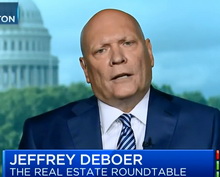This week President Trump and key Democrats have spoken out about the possibility of a "grand bargain" infrastructure deal in the new Congress, if Democrats gain control of the House in the mid-term elections next month. (Politico, Oct. 22).
- In February, the Trump Administration released its long-awaited Legislative Outline for Rebuilding Infrastructure in America, proposing at least $1.5 trillion in new investment across infrastructure asset classes; incentivizing greater state and local funding; and shortening the project permitting process to two years. (Roundtable Weekly, February 17, 2018).
- President Trump recently told Fox Business that his administration is aiming to slash the amount of time it takes to complete transportation projects and will focus on infrastructure legislation in the upcoming congressional Lame Duck session. "Infrastructure is going to be starting right after the midterms and we think that is going to be an easy one," Trump said. (Fox Business, Oct. 17)
- Despite both parties acknowledging the importance of infrastructure legislation, the fundamental issue of how to pay for projects remains – with many Republicans expected to balk at massive deficit spending to fund the package. ( Politico, Oct. 22)
- Last week, New York Gov. Andrew Cuomo sent a video to President Trump, urging him to provide federal aid for the completion of the Gateway tunnel project that connects New York and New Jersey, and services a key rail link in the Northeast Corridor between Washington, D.C. and Boston. Both New York and New Jersey have already agreed to contribute half of the estimated $12.7 billion it will cost to repair and rebuild, and the states expect the federal government to contribute the remaining amount. (Curbed New York, Oct. 19) The Trump administration, however, has stated the federal commitment for Gateway should not exceed 20 percent. (POLITICO Magazine, July-August 2018).
- In September 2017, The Roundtable submitted comments to the Federal Transit Administration (FTA), in response for public input on a proposed rule that would make "greater use of public-private partnerships (P3s) and private investment in public transportation capital projects." The comments emphasize how real estate and infrastructure have a synergistic, two-way relationship, where growth in one asset class benefits the other. (Roundtable Weekly, Sept. 29, 2017)
 |
Roundtable President and CEO Jeffrey D. DeBoer addressed the impact of these demographic trends, and their impact on real estate and the nation's evolving infrastructure needs, in an interview on CNBC's SquawkBox last June. (CNBC Squawkbox interview and Roundtable Weekly, June 9, 2017). |
- Another influence on the need for innovative transit-oriented infrastructure projects are societal trends. As Millennials dominate the work force and Baby Boomers retire from it, more public transportation options will be critical as profound changes are anticipated in car use and ownership. Innovations in driverless vehicles and ride-hailing services are accelerating a "transportation revolution" as household vehicle ownership is forecast to drop, massive numbers of parking spaces may become obsolete, and billions of square feet of transit-oriented real estate could be unlocked for development.
- Roundtable President and CEO Jeffrey D. DeBoer addressed the impact of these demographic trends, and their impact on real estate and the nation's evolving infrastructure needs, in an interview on CNBC's SquawkBox last June. ( CNBC Squawkbox interview and Roundtable Weekly, June 9, 2017).
- In January of this year to President Trump on infrastructure development, Roundtable President and CEO Jeffrey DeBoer commented on the positive economic benefits that infrastructure legislation would bring to the nation. "Modernizing our roads, tunnels, mass transit, drinking water, power grid, and telecommunications systems – in rural and urban areas alike – are vitally important to economic growth, productivity and America's global competitiveness," DeBoer said.
He added, "Real Estate Roundtable members are experienced in addressing the financing, permitting and government partnership issues that frequently slow or stop infrastructure projects. We intend to provide positive feedback and ideas to all policymakers working to facilitate improvements in our nation's infrastructure." (Roundtable Letter on Infrastructure Funding, Jan. 11)

